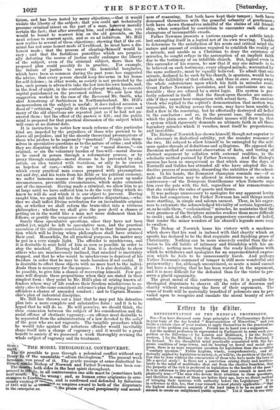tiwis ° '.... "11TE MODEL THEOLOGICAL CONTROVERSY. night. The Cs possible
to pass through a polemical conflict without any Drury Ls of the =amiable "odium theologicum." The present week iwmance. yen proof of it. The gentle passage at arms-dialectical be- Strand, rem.he Bishop of Norwich and Father Newman has been con-
The theatrei both sides in the heat spirit throughout
proceed to ed°113', in all controversies one side mist be ‘sometimes both netfmontb. %.1.4xothe wrong• and, as human error originates in erre-
stnfters to Le ' . ns, and is confirmed and defended by fallacious
111511ally exciting 0 of 1851 will be at WNW, as umPires award te both of the disputants in the.euterprise an praise of equal perspicacity and sound- ,
nem of reasoning. But both have kept their temper; both have demeaned themselves with the graceful urbanity of gentlemen ; both have shown themselves mindful of the claims of old friend- ship, when compelled by conviction to encounter each other as champions of incompatible creeds. Father Newman presents a curious example of a subtile intel- lect entangling itself in a logical net of its own weaving. Unable to determine to the satisfaction of his acute and critical mind the nature and amount of evidence required to establish the reality of a miracle, and unable as a Christian to deny the existence of miracles, he sought refuge in the assumption of an implicit faith due to the testimony of an infallible church. But, logical even in this surrender of his reason, he saw that if any one miracle is to be believed on such testimony, every alleged miracle warranted by the same authority, must be equally believed. To miracle, that one miracle, declared to be such by his church, is spurious, would be to admit the fallibility of that church, and thus at once sweep away the whole substructure upon which his faith in miracles rests. Grant Father Newman's postulates, and his conclusions are un- deniable ; they are educed by a strict logic. His system is per- fectly coherent in itself. But the finest-spun theories are unten- able if they cannot bear comparison with actual facts. The ancient Greek who replied to the sophist's demonstration that motion was impossible, by walking across the room, may have been unable to find a flaw in the reasoning, but he effectually destroyed all belief in the conclusion : and so, in the present ease, the conclusion which the plain sense of the Protestant masses will draw is, that a system which rigorously demands an ultimate faith in all those legendary miracles which it vouches, must itself be preposterous and incredible.
The Bishop of Norwich has shown himself, though not superior to his adversary in dialectical subtilty, yet the sounder reasoner of the two. He refused to allow himself to be entangled by the self- spun spider-threads of definitions and syllogisms. He opposed the Baconian method of constant observation of facts and testing of abstract argument by collation with external ;Talkies, to the scholastic method pursued 'by Father Newman. And the Bishop's success has been as unequivocal as that which since the days of Torrioelli and Galileo has attended all who have adopted the in- ductive process of reasoning, discarding the subtilties of the school- men. In his hands, the Romanist champion reminds one—if so light an illustration may be allowed in reference to so solemn a controversy—of the Bourgeois Gentilhomme when Toinette raps him over the path with the foil, regardless of his remonstrances that she violates the rules of quarte and tierce.
It was perhaps unnecessary to apologize for any apparent levity in this last comparison; for Father Newman has said things much more startling, m simple and solemn earnest. Thus in his eager- ness to extenuate the acknowledged triviality of certain legendary, or, as he calls them, " ecclesiastical " miracles, he maintains that the very greatness of the Scripture miracles renders them more difficult to credit ; and, in effect, calls them preparatory exercises of belief, that render the minor wonders of his church's legends more easy to swallow.
The Bishop of Norwich bears his victory with a meekness which shows that his soul is imbued with that charity which an apostle has declared to be the first requisite and finishing grace of Christianity. Nothing can be more sincerely cordial than the al- lusion to his old habits of intimacy and friendship with his an- tagonist; nothing more touching than the ready kindliness with which he withdraws and apologizes for an unpremeditated expres- sion which he feels to be unnecessarily harsh. And perhaps Father Newman's command of temper is still more wonderful and praiseworthy; for, although unconvinced, so acute a mind cannot but have a misgiving that he has been worsted in the argument, and it is more difficult for the defeated than for the victor to pre- serve a placid equanimity. The great moral of this controversy is, that it is possible for theological disputants to observe all the rules of decorum and charity without weakening the force of their arguments. The cause of truth will be materially benefited if polemists can be pre- vailed upon to recognize and emulate the moral beauty of such conduct.


























 Previous page
Previous page